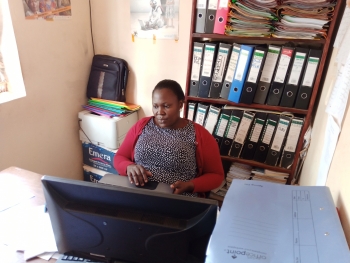Community Based
Introduction:
Iganga Municipal Council Community Based Department is guided by the social development sector strategy investments plan (SDIP) 2017 -2022 and NSSPI. The sector is further guided by various existing laws, policies and national action plans and relevant project documents. Carrying on from its mother ministry, the sector promotes issues of social protection, gender, quality, human rights, culture, decent work conditions and empowerment of vulnerable groups such as women, children, orphans, PWDs youth and the elderly.
Mission:
To work towards social and economic transformation of vulnerable and marginalized groups as well as the entire society in the Municipal Council for sustainable and gender responsive development.
Goal:
Promote employment, rights of vulnerable groups for wellbeing and gender responsive development.
Objectives:
- To improve the functionality and accessibility to quality non-formal and numeracy services.
- To promote gender mainstreaming in development plans, programs and projects.
- To support and strengthen institutional, policy, legal mechanisms and human resource capacity for a coordinated effective service delivery to vulnerable people.
- To strengthen community development department data collection, demand, analysis, MIS and M + E systems.
- To reduce gender based violence and promotion of women’s rights.
- To promote economic empowerment of the special interest groups (women, youths, the elderly and persons with disabilities).
- To ensure that PWDs receive rehabilitation services thus to raise awareness on their needs and potentials.
- To promote the implementation of equalization of opportunities to advocate for and promote effective service delivery and collaboration between service providers for women, youths, PWDs, OVC and the elderly in order to improve their wellbeing.
- To protect vulnerable children from violence, abuse and exploitation.
ACHIEVEMENTS FOR FY 2019/20
- Recovery of both UWEP (10,000,000) and YLP (4,000,000)
- Case management
- Mapping and Supervision of child care institutions.
- Monitoring of all UWEP groups.
- Monitoring of YLP groups
- Mobilization and registration of youth groups
- Mobilized new FAL groups, Faith Afayo, Faith ministries, Kisakyamukama
- Dissemination of FAL and parental guidelines.
- Refresher trainings for Parasocial workers.
CHALLENGES
- Changing programme guidelines
- Competing activities
- Inadequate resources
- Lack of office space.
- No implementing partner to give support for child related issues.
- Un cooperative stake holders in case management
Sector Policy FY2020/21
- The Youth Livelihood Programme (YLP) shall be mainstreamed in the Local Government Budgets;
- Uganda Women Entrepreneurship Programme (UWEP) shall not be decentralized / combined with the SDS Non-Wage Recurrent Transfers because of the revolving fund element embedded in the grants;
- Similarly, SAGE will not be decentralized;
- The Functional Adult Literacy Programme will change implementation modalities and shall be called Integrated Community Learning for Wealth Creation; and
- Local Governments to adopt ICOLEW in implementing adult literacy using the existing grants.
Sector Policy Priorities FY2020/21
- Livelihood improvement through Youth Livelihood Programme (YLP); Uganda Women Entrepreneurship Programme; Special Grant for Elderly and Persons with Disabilities; Social Assistance Grant for Empowerment;
- Employment enhancement through YLP, UWEP and Youth Venture Capital Fund;
- Strengthen systems and structures to prevent and respond to Gender Based Violence (GBV) and Child protection;
- Strengthen systems and structures to protect children;
- Labour Administration;
- Library services; and
- Promotion of Social Safe guards in all infrastructure projects.
Head of department-Principal Community Development Officer

